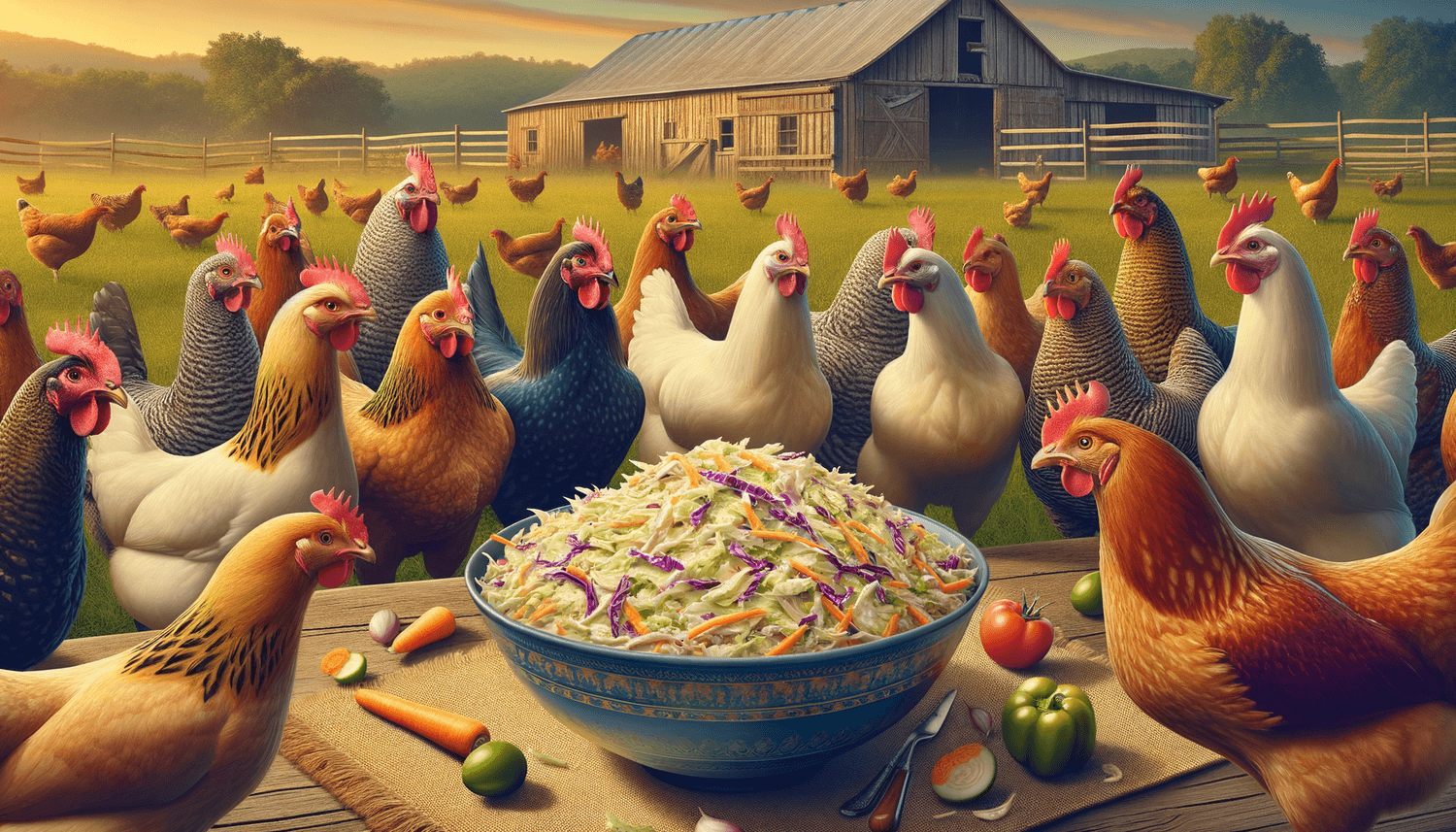Picture this: you’ve just enjoyed a delicious meal featuring crispy coleslaw and you’re tidying things up. Your backyard chickens are clucking and pecking around, giving you those adorable side-eye looks that seem to say, “Hey, share the love!” But can chickens actually eat coleslaw? In this fun and informative blog post, we’ll explore whether coleslaw should make its way into your flock’s menu, the importance of a well-rounded diet, any potential benefits or risks, the nutritional goodies hidden in coleslaw, and how best to serve it up for your feathered friends. Let’s cluck and roll!
Can chickens eat coleslaw?
Yes, chickens can eat coleslaw, but it’s important to serve it in moderation. Coleslaw typically contains shredded cabbage and carrots, which are safe for chickens to consume. However, be cautious of any added dressings, salt, or sugar, as these ingredients can be harmful to your flock if consumed in excessive amounts.
A balanced diet for happy, healthy chickens
Just like us humans, chickens thrive on a balanced diet to maintain their health and well-being. Ensuring that your flock gets the right nutrition is essential for their productivity, growth, and happiness. A chicken’s diet should primarily consist of high-quality chicken feed, which provides the necessary nutrients, vitamins, and minerals that they need to stay healthy and lay delicious eggs.
Chicken feed should ideally make up around 80-90% of your chickens’ diet, with the remaining 10-20% including treats such as fruits and vegetables. These treats offer your chickens not only a delightful change of pace but also add variety and essential nutrients to their diet. However, it is important to monitor the types and quantities of the treats you provide to ensure your chickens maintain a balanced intake of nutrition. Remember, it’s all about keeping your flock happy and healthy, one day at a time!
Nutritional value of coleslaw for chickens.
Feeding coleslaw to chickens can provide some nutritional value, depending on the ingredients. The key components of coleslaw, cabbage, and carrots, are rich in essential vitamins and minerals that can benefit your chicken’s health. Cabbage, in particular, is packed with vitamins such as vitamin C and K, as well as being high in fiber. This leafy green can help support your chickens’ immune systems and promote healthy digestion.
Carrots, another common ingredient in coleslaw, also have valuable nutrients for chickens. They are rich in antioxidants, especially vitamin A, which is essential for maintaining good vision and a robust immune system. The fiber and minerals found in carrots can further contribute to maintaining healthy digestion and overall well-being for your flock. Additionally, the high water content of these vegetables adds hydration to their diet, which is crucial for their overall health.
It is important to note, however, that coleslaw can sometimes contain dressings, salt, and sugar, which can be harmful to your chickens if consumed in excessive amounts. Therefore, when feeding coleslaw to your chickens, it’s best to give them small amounts of plain, undressed vegetables to avoid any potential harm. This way, your chickens can enjoy the nutritional benefits of coleslaw without compromising their well-being.
Nutrition table of coleslaw for chickens.
| Information | Description |
|---|---|
| Nutritional Value | Coleslaw containing cabbage and carrots provides vitamins, minerals, antioxidants, and fiber. |
| Suggested Serving Size | Small amounts as treats, making up no more than 10-20% of the chicken’s diet. |
| Safe Feeding Practices | Provide plain, undressed coleslaw without added salt, sugar, or dressings. |
| Preparation | Shred or chop coleslaw vegetables (cabbage and carrots) into small, manageable pieces. |
| Potential Risks | Added dressings, salt, and sugar can be harmful if consumed in excessive amounts. |
| Hydration | High water content in coleslaw vegetables provides additional hydration. |
| Digestion | Fiber content promotes healthy digestion. |
| Seasonal Availability | Cabbage and carrots are widely available year-round, providing a constant source of nutrition. |
| Other Benefits | Variety in diet can help keep chickens happier and more engaged during feeding time. |
Safe vegetables to include in coleslaw for chickens
When making coleslaw specifically for your chickens, it is a good idea to include other safe and nutritious vegetables to provide more variety and even greater nutritional benefits. Here are a few vegetables you can mix with cabbage and carrots to create a tasty and healthy treat for your flock:
- Broccoli – a source of vitamins (A, C, and K) and minerals (calcium, iron, and potassium).
- Kale – packed with vitamins (A, C, and K), minerals (calcium, potassium, and iron), and antioxidants.
- Spinach – high in vitamins (A, C, and K), minerals (calcium, iron, and magnesium), and fiber.
- Beets – contain vitamins (A, C, and K), minerals (calcium, potassium, and iron), and antioxidants, while beet greens are an excellent source of calcium.
Prevention of overfeeding
Although it is tempting to give your chickens an abundance of tasty, healthy treats like coleslaw, it is crucial to remember that moderation is key to their well-being. Overfeeding can lead to an unbalanced diet, causing health issues and decreased productivity within your flock. By providing the right amounts of chicken feed and treats, you can help maintain the optimal diet for a happy and healthy flock.
A treat to remember
Feeding chickens coleslaw can be an enjoyable experience for both you and your flock. Just remember to ensure that the coleslaw is prepared safely, using only fresh, undressed vegetables. By serving coleslaw in moderation as part of a well-rounded diet, your chickens can experience the various nutritional benefits it has to offer. Happy clucking!

















